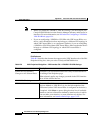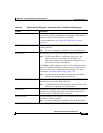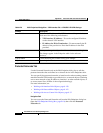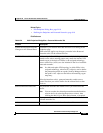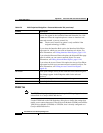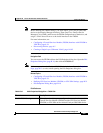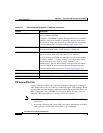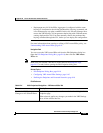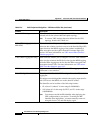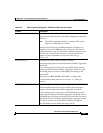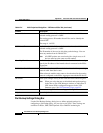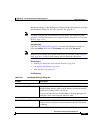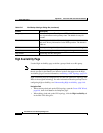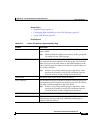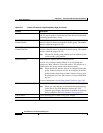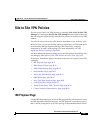
Appendix B Site-to-Site VPN User Interface Reference
Create VPN Wizard
B-30
User Guide for Cisco Security Manager 3.0.1
OL-8214-02
Enable VRF Settings When selected, enables the configuration of VRF settings on the
selected hub for the selected hub-and-spoke topology.
Note To remove VRF settings that were defined for the VPN
topology, deselect this check box.
1-Box (IPSec Aggregator +
MPLS PE)
When selected, enables you to configure a one-box VRF solution.
In the one-box solution, one device serves as the Provider Edge (PE)
router that does the MPLS tagging of the packets in addition to
IPSec encryption and decryption from the Customer Edge (CE)
devices. For more information, see VRF-Aware IPSec One-Box
Solution, page 9-42.
2-Box (IPSec Aggregator Only) When selected, enables you to configure a two-box VRF solution.
In the two-box solution, the PE device does just the MPLS tagging,
while the IPSec Aggregator device does the IPSec encryption and
decryption from the CEs. For more information, see VRF-Aware
IPSec Two-Box Solution, page 9-43.
VRF Name The name of the VRF routing table on the IPSec Aggregator. The
VRF name is case-sensitive.
Route Distinguisher The unique identifier of the VRF routing table on the IPSec
Aggregator.
This unique route distinguisher maintains the routing separation for
each VPN across the MPLS core to the other PE routers.
The identifier can be in either of the following formats:
• IP address:X (where X is in the range 0-999999999).
• N:X (where N is in the range 0-65535, and X is in the range
0-999999999).
Note You cannot override the RD identifier after deploying the
VRF configuration to your device. To modify the RD
identifier after deployment, you must manually remove it
using the device CLI, and then deploy again.
Table B-11 Edit Endpoints Dialog Box > VRF Aware IPSec Tab (continued)
Element Description



